
Martha Eliot
United States Children’s Bureau
For administrative achievement in the organization and operation of the Emergency Maternal and Infant Care Program of the Children’s Bureau. Read about the achievement.
For more than two decades, Dr. Martha Eliot has been a courageous and inspiring leader for improvement in standards of medical care for mothers and infants. As director of the Division of Child and Maternal Health, Children’s Bureau, US Department of Labor, and subsequently as assistant and associate chief of the Bureau, she has been a militant advocate of increasing government participation in the improvement of health services.
The passage of the Social Security Act of 1935 with the allotment of federal funds to the states for the provision of direct services brought new responsibilities and new opportunities. It is impossible to evaluate fully at this time the effect of the new services made possible by these funds upon the health of mothers and children throughout the nation. It is not without significance, however, that during this period maternal and infant mortality rates dropped sharply. One cannot look at these years of achievement without seeing in them a continuing theme, a calm and determined insistence that a better quality of care could and must be available to all mothers and children.
